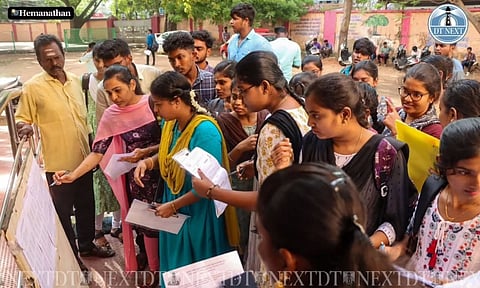

CHENNAI: With many private universities and colleges in the State introducing new courses, students, who want employment in public services, are facing severe hardship since their degree certificates have to be cleared by the Equivalence Committee that functions under the Higher Education department.
The Equivalence Committee determines if educational qualifications from various universities are equivalent to the qualifications required for public service jobs that are offered by Tamil Nadu Public Service Commission (TNPSC) and Tamil Nadu Teachers Recruitment Board (TNTRB).
Additionally, the committee also considers if qualifications are equivalent to pursue higher studies. However, certain private universities introduce new course names and claim that the course will be equivalent to what was prescribed either by TNPSC or TNTRB for a particular public service employment.
Candidates whose qualification is other than what’s prescribed, must produce documents issued by the Equivalence Committee.
Where problem begins
A senior official from the Higher Education Department said that students are lured by fancy names of courses when they are newly introduced by private institutions.
“The institutions never indicate that a new course will not be equivalent for the qualifications prescribed by the government recruitment agencies,” he added. “After pursuing a new course, aspirants to job jobs apply for a particular post that’s notified by either TNPSC or TNTRB. That’s when they realise that the certification will not match with the prescribed degree for the job. And so, automatically his/her application would be rejected.”
The official also recalled an incident at the Anna University, which had introduced a Master’s degree in Research Environmental Technology between 2013 to 2016. “After scrutinising the course structure and subjects, the Equivalence Committee made it clear in 2021 that it was not equivalent to MSc Environmental Science for the purpose of employment in public service in the State. Several students were affected,” he stated.
Similarly, University of Madras had offered MSc in Biotechnology, but whether it’s equivalent to MSc Botany for the purpose of employment in public services is yet to be determined by the Equivalence Committee. “Likewise, the state-owned Annamalai University’s BA Police Administration course was not also equivalent to bachelor’s degree in Criminology for getting a job,” he pointed out.
A senior official from TNTRB also said that most students pursue UG courses without verifying whether they are valid for getting government jobs. “They realise only when they get the information from the Equivalence Committee that their UG degree is not valid for getting a particular in public services,” he added.
How equivalent committee functions
Meetings of chairpersons, boards of studies and subject experts have been conducted for getting Equivalence Certificate of courses offered to get government jobs, and also for pursuing higher studies.
The recommendations of the Board of Studies regarding equivalence issues have been placed in the meetings for approval and issuing necessary government orders.
“So far, 25 Equivalence Committee meetings have been conducted, and 868 courses for jobs and 142 courses for higher studies (total 1,010 courses) have been certified as equivalent or not equivalent,” explained the official.
However, K Dhanasekaran, an educational consultant in the city said that the process of obtaining approval from the Equivalent Committee sometimes causes delays and uncertainty for students seeking higher studies or jobs. “To verify the equivalence of a degree, students need to go through a formal process of submitting various documents and certificates to the equivalence committee, which is time-consuming. The Equivalence Certificate could be a hurdle for aspirants of certain jobs in government organisations,” he pointed out.
Dhanasekaran also suggested developing online platforms to facilitate the application and evaluation process to make it more accessible.
Quoting a recent case in the High Court, a senior advocate in the city said that a petitioner had completed BSc (Ed) integrated course from a central institution and had also completed a Master’s degree in a State-run university in Tamil Nadu.
“Subsequently, the petitioner completed Teachers Eligibility Test, which is mandatory to get a job in government schools, and was also selected by the TN Teachers Recruitment Board. However, the appointment was withheld on the ground that the petitioner did not submit an equivalent degree for UG degree,” he rued.